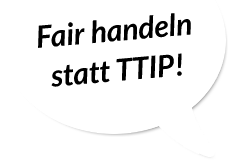Trump sät Wind, weil er Sturm ernten will / Trump sows wind, because he wants to harvest a storm
„Mit der Verhängung von zusätzlichen Zöllen gegen die Stahl- und Aluminiumeinfuhren aus der Europäischen Union hat Präsident Trump einen entscheidenden Schritt zur Untergrabung der internationalen Handelsordnung getan. Er will die Rechtsordnung der WTO durch das Recht des Stärkeren ersetzen“ kritisiert Helmut Scholz scharf. Scholz ist Obmann der Linksfraktion im Handelsausschuss des Europaparlaments.
Scholz bekräftigt die Notwendigkeit für EU Kommission und den Rat, nun ruhig und mit Vernunft zu reagieren: „Es ist richtig, im Rechtsrahmen der WTO zi verbleiben und dort unverzüglich und entschieden den Fall vor das zuständigen Schiedsgericht der WTO zu bingen. Gemeinsam mit allen anderen betroffenen Staaten sollten wir nun ein klares Bekenntnis zur Rechtstaatlichkeit und zum Prinzip der Gleichheit vor dem Recht ablegen. Trump handelt illegal.“
Einen Handelskrieg lehnt Scholz ab. „Durch Strafzölle und Sanktionen drohen für alle Beschäftigten in den unterschiedlichsten Bereichen negative Folgen, weil die international verzahnte Wirtschaft und Produktion nicht mehr nur national oder bilateral gesehen werden kann.“ Wertschöpfung erfolge heute zunehmend entlang global verzweigter Produktionsketten.
Eine Lösung sieht Scholz nun in zwei Schritten: „Wir sollten im Rahmen der OECD auf eine unverzügliche Tagung des Globalen Stahl Forums drängen, um die notwendigen Konsequenzen aus dem Markteingriff der Amerikaner auf die weltweite Angebotssituation für Stahl und Aluminium gemeinsam festzulegen. Dabei muss die Sicherung von Arbeitsplätzen Priorität haben.“ Dies müsse noch im Verlauf der gerade in Paris ablaufenden OECD Ministertagung aktiv angegangen werden.
Scholz spricht sich in diesem Zusammenhang erneut für eine schnellstmöglich abzustimmende gemeinsame Strategie von EU-Kommission, dem EU-Wirtschafts- und Sozialrat unter aktiver Einbeziehung der Gewerkschaften v.a. in den betroffenen EU-Mitgliedstaaten als auch des ETUC und IndustrieAll sowie der Mitgliedstaaten und entsprechenden Industrievereinigungen aus.
Den zweiten Schritt sieht Scholz in der Diversifizierung unserer Wirtschaftsbeziehungen. „Diese Krise ist auch eine Chance, unsere europäischen Wirtschaftsinteressen zu artikulieren und auf unsere potentiellen Partner auf dem eurasischen Kontinent, in Lateinamerika und in Afrika mit verbesserten, fairen Angeboten zuzugehen und dafür auch die multilateralen Handelsstrukturen weiter zu entwickeln und zu stärken.“
Scholz meint ferner, „Wir müssen der Gefahr ausweichen, in die von Trump inszenierten Konflikte hineingezogen zu werden. Diese Konflikte sind nicht im europäischen Interesse!“, betont Scholz. „Im 21. Jahrhundert darf es keine ‚Ich zuerst‘ -Strategie geben, wenn die riesigen, für alle Staaten bestehenden globalen Herausforderungen doch nur durch gemeinsames Handeln bewältigt werden können.“
_____________________________________________________________________________
Trump sows wind, because he wants to harvest a storm
"By imposing additional tariffs on steel and aluminum imports from the European Union, President Trump has taken a decisive step in undermining international trade regulations. He wants to replace the legal order of the WTO by the law of the strongest," criticizes Helmut Scholz sharply. Scholz is the coordinator of the Left Group GUE/NGL in the Trade Committee of the European Parliament.
Scholz reaffirms the need for the EU Commission and the Council to respond calmly and reasonably: "It is right to remain in the WTO legal framework and to immediately and decisively bring the case before the relevant WTO tribunal. Together with all the other countries concerned, we should now make a clear commitment to the rule of law and to the principle of equality before the law. Trump is acting illegally."
Scholz rejects a trade war. "Penalty tariffs and sanctions threaten to have negative consequences for all employees in a wide range of areas, because the internationally interrelated economy and production can no longer be treated from a national or bilateral perspective." Today, value creation increasingly occurs along globally diverse production chains.
Scholz now sees a solution in two steps: "Within the framework of the OECD, we should press for an immediate meeting of the Global Steel Forum in order to jointly define the necessary consequences in reaction to the American market intervention on the global supply situation for steel and aluminum. Priority must be given to the securing of jobs." This should be immediately addressed in the course of the OECD ministerial meeting, which is currently ending in Paris.
In this context, Scholz again advocates a joint strategy to be adopted by the EU Commission, the EU’s Economic and Social Committee - with the active involvement of the trade unions in the EU Member States concerned, as well as the ETUC and IndustrieAll - as well as the Member States and related industrial associations.
Scholz sees the second step in the diversification of our economic relations. "This crisis is also an opportunity to articulate our European economic interests and to approach our potential partners on the Eurasian continent, in Latin America and Africa, with improved and fair offers, and to further develop and strengthen multilateral trade structures."
Scholz concludes: "We must avoid the danger of being drawn into the conflicts staged by Trump. These conflicts are not in the European interest! "
Scholz emphasizes that "In the 21st century there cannot be a ‘me first’-strategy, if the huge global challenges facing all states can only be tackled through joint action.”
- Artikel teilen
- Zum Seitenanfang

